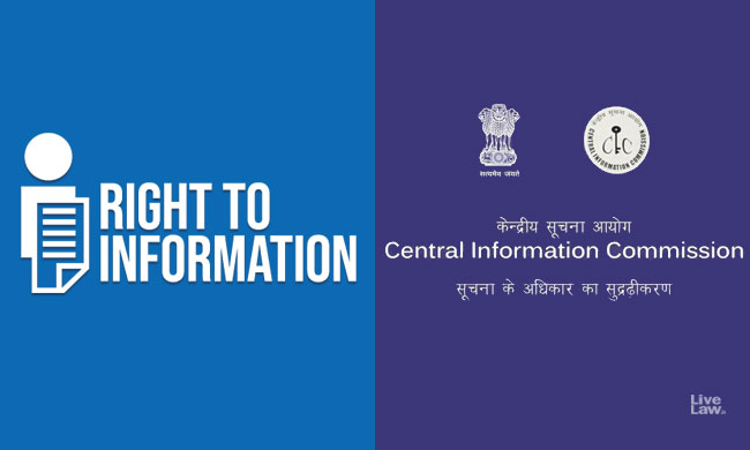

In a significant order, the Central Information Commission has said that a Husband is not entitled to seek information regarding bank details & income tax returns of his wife under the Right to Information Act, 2005. The Information Commissioner Neeraj Kumar Gupta observed that the filing of the Income Tax Returns by an individual with the Income Tax Department is not a.
In a significant order, the Central Information Commission has said that a Husband is not entitled to seek information regarding bank details & income tax returns of his wife under the Right to Information Act, 2005.
The Information Commissioner Neeraj Kumar Gupta observed that the filing of the Income Tax Returns by an individual with the Income Tax Department is not a public activity.
"It is in the nature of an obligation which a citizen owes to the State viz. to pay his taxes, this information cannot be disclosed to the applicant in the absence of any larger public interest", the Commission said.
The matter before the Court
The Appellant/Husband wanted the information related to name and branch address of all those banks wherein his spouse was having account, at any point of time, during the financial years 2012-2013 to 2017-2018.
The appellant contended before the Commission that he was seeking information about his legally wedded wife, and therefore, the CPIO should have invoked Section 11 of the RTI Act, 2005.
Further, he submitted that the information regarding her bank details & income tax returns should be disclosed.
To this, the respondent (CPIO, O/o. the Income Tax) submitted that the appellant was seeking clarification with regard to the bank details & income tax returns of his wife, which is personal in nature and therefore CPIO, O/o. the Income Tax claimed exemption u/Section 8(1)(j) of the RTI Act, 2005.
It was also submitted that Section 11 of the RTI Act, 2005 can only be invoked if the CPIO intends to disclose the personal information and therefore, once the CPIO is satisfied that the information is to be denied under Section 8(1)(j) of the RTI Act, 2005, Section 11 is not required to be invoked.
Lastly, the respondent stated that prima facie, no larger public interest is involved in the matter and hence, the CPIO did not intend to disclose this information.
Decision of the Commission
Agreeing with the stand of the respondent in not invoking Section 11 of RTI Act, the Commission said,
"The CPIO is expected to follow the procedure of Section 11 when he 'intends to disclose any information or record'. In the present case, the CPIO did not find any merit in disclosure and accordingly, Section 11 was not invoked."
Further, with regards to the applicability of Section 8(1)(j) of the RTI Act, 2005 for non-disclosure of the third party bank details and income tax returns, the Commission referred to the Supreme Court's Judgment in the case of Girish Ramchandra Deshpande v. Central Information Commission [(2013) 1 SCC 212].
In the above said case, the Apex Court had ruled the details disclosed by a person in his income tax returns are "personal information" which stand exempted from disclosure under clause (j) of Section 8(1) of the RTI Act, unless involves a larger public interest and the Central Public Information Officer or the State Public Information Officer or the Appellate Authority is satisfied that the larger public interest justifies the disclosure of such information.
The Commission also referred to the Delhi High Court judgment in Vijay Prakash v. Union of India [AIR 2010 Delhi 7] in which it was held that, in a private dispute between husband and wife, the basic protection afforded by virtue of the exemption from disclosure enacted under Section 8(1)(j) cannot be lifted or disturbed unless the petitioner is able to justify how such disclosure would be in 'public interest'.
The Court also noted the definition of 'Third Party' and observed that the husband in this case is a 'third party' for the purpose of the RTI Act.
"From the words circumscribed u/Section 2(n) of the RTI Act, 2005, it is vividly clear that any person other than the citizen making a request for information can be termed as 'third party'. Therefore, Ms. Mamta @ Mamta Arora being a person other than the RTI applicant surely comes within the definition of 'third party'. Moreover, the CPIO has also not intended to disclose the information treating it as confidential and has rather pleaded that there is no public interest in the matter. This Commission also does not find any public interest which outweighs the harm caused in its disclosure."
Lastly, the Commission, after considering the factual matrix of the case was of the opinion that in the absence of any larger public interest in the matter, the appellant is not entitled to seek information regarding bank details & income tax returns of his wife which is exempted u/Section 8(1)(j) of the RTI Act, 2005.
With the above observations, the appeal was disposed of.